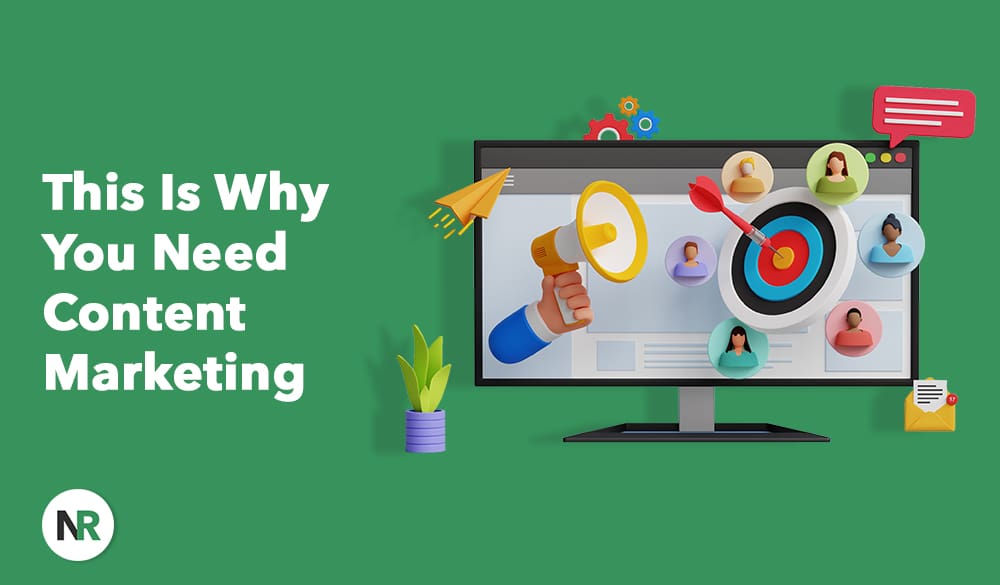This article will explain why you need content marketing to reach your target audience and grow your business.
Content marketing is all the rage in 2025, and for good reason. With all the top companies being on practically every platform available, you’d be crazy not to join them.
If you’re still wondering whether content marketing will help you increase sales, the answer is a resounding “yes.”
However, the connection from content marketing to sales isn’t always a direct, linear path. There are many different types of content marketing, and they each serve different purposes — some of which don’t lead to sales right away.
But the key to all types of content marketing is increasing brand awareness, which indirectly leads to greater profits with time.
In this article, we’ll explain the following:
- The definition of content marketing
- Different types and examples of content marketing
- How content marketing improves the sales process
- How a content marketing strategy can be used for lead generation
- Why content marketing is important
- How you can measure your return on investment (ROI)
You can take control of your online reputation, whether you’re working on your personal reputation or your professional digital presence. Call us at 844-461-3632 for more information.
What Is Content Marketing?
Content marketing is a strategic approach to marketing that involves creating relevant content for your audience on a consistent basis in order to provide free value to them and increase sales over time.
Its purpose is to attract and retain a specific target audience and ultimately convince them to buy from you. Essentially, the goal is to engage potential customers by sharing amazing content that encourages them to take action.
Many successful companies use content marketing to position themselves as thought leader in their industry. For example, they might have a blog, a YouTube channel, or a podcast where they share some of their industry knowledge with consumers for free in order to increase trust with their target audience.
Having a trustworthy brand is a big deal. Consider these stats:
- According to over 95% of consumers, the top factor that increases trust in a company is if it has a good online reputation.
- 90% of online shoppers won’t purchase from a company with a poor reputation.
- Customers will pay more for the same item from a company they’re unfamiliar with versus one that’s had a recent scandal.
With all the scams and fake news that have been circulating online for years, trust is one of the most valuable forms of currency today. Consistent and high-quality content marketing will earn your audience’s trust and garner confidence from potential customers.
What Are the Different Types of Content Marketing?
With so many different types of content and platforms to choose from now, the world is pretty much your oyster when it comes to having a content marketing strategy. Before the internet existed, many companies mailed out printed newsletters to their customers or published their own brochures or company magazines.
Nowadays, it’s not uncommon for the biggest companies to have an active presence on all the major social media platforms like Facebook, X, and Instagram, plus YouTube, Pinterest and even TikTok.
Many companies also have a blog, email newsletter or podcast in addition to their social media content. Some even have all three.
And it’s not just major corporations that prioritize content marketing efforts. Many small mom-and-pop businesses now have a website and a Facebook page at the bare minimum.
Let’s briefly go over the different types of content marketing.
Articles and Blog Posts
Online articles and blog posts — including those on your own website and ones that you write as a guest for other sites — are excellent for search engine optimization and generating organic traffic. They help you establish authority while educating your audience, and they can easily be repurposed into other types of content, like emails, social media posts or videos.
Downloadable Resources
Downloadable content like checklists and templates are actionable and highly valuable. By offering resources like these for free, you’ll be able to grow your email list and add subscribers who are interested in exactly the type of product or service you offer.
Infographics
Infographics are both visually appealing and easy to digest. They’re especially useful when it comes to data visualization, summaries and step-by-step guides. Plus, they’re highly shareable on social sites like LinkedIn and Pinterest.
Live Events and Webinars
Live events and webinars are interactive and excellent for increasing audience engagement. Plus, they’ll cement your authority in your niche and give you a platform for selling premium products and services. Moreover, your events can be covered in a blog post or turned into video clips for social media.
Newsletters
Email marketing lets you directly communicate with your audience in a place that not every brand has access to: their inbox. This approach is excellent for nurturing leads, showcasing your latest products and services, promoting offers, and sharing high-value content.
Podcasts
Podcasts allow you to build a deep connection with your audience, and they’re the perfect outlet for in-depth discussions, interviews and other types of thought leadership. Plus, every podcast episode can be repurposed into a blog post or social media snippet.
Social Media Content
Few types of content are better at driving engagement and building a community than social media content. Posts, Stories, Reels and live videos are the perfect opportunities for creating short-form content, jumping on a trend, and giving real-time brand updates to your audience.
Video Content
Today, practically everyone loves video content, which is highly engaging and easy to share. Video works best for behind-the-scenes content, product demos, storytelling, and tutorials. Consider platforms like Instagram Reels, TikTok and YouTube to reach an audience with video content.
What Should My Marketing Strategy Be?
There aren’t really any hard-and-fast rules when it comes to what type of content marketing strategy will work best for your business since every business has different needs and goals.
An interior design company, for example, should focus most of its efforts on Instagram and Pinterest, along with YouTube and a visual-heavy blog. These are the platforms that are best for sharing stunning visual content. The interior design company’s marketing team could shoot home decor video tutorials and share before-and-after photos of their clients’ homes.
A gas station, on the other hand, doesn’t need to have such a visual presence. Instead, a Facebook page and a website may be the best approach. They could also use a text-centric social platform like X to promote discounts and specials.
If you’re a newbie entrepreneur and not sure where to start, a website, solid search engine optimization and a social media profile can get the ball rolling. Choose the social media platform that a majority of your target audience is on.
As a general rule, the more content you can produce, the better. That’s why you want to start small. It’s better to be creating quality content frequently for one or two platforms than to only produce once in a while per platform because you’re juggling too many.
At NetReputation, we work with individuals and businesses to help them build and take control of their online reputation. Give us a call at 844-461-3632 to learn more.
2 Major Benefits of Content Marketing
Next, we’re going to dive into two important benefits of content marketing:
- Improving your business’s lead generation
- Making the sales process more efficient
There are a number of methods for increasing leads, including email marketing, giving away ebooks in exchange for contact information, and more. We’ll go over three strategies we recommend.
Then, once you have those leads, content marketing can help you speed up the sales process. By creating valuable content that solves the problems your potential customers face, you can give them the exact push they need to go through with that purchase.
1. Improving Lead Generation
Quality content marketing can increase traffic to your website and other pages, which of course also means more leads.
For B2B cases, lead generation tactics can help your prospects feel familiar with you and your company even before they speak to a sales rep. This can make it much easier for you to close the deal and gain a customer once you make contact.
In fact, 80% of B2B buyers consume at least three pieces of content before their first sales call, according to Demand Gen’s 2016 Content Preferences Survey.
Here are some examples of content you can create to generate more leads for your salespeople.
Email Newsletters
Tons of companies nowadays send out frequent email newsletters to attract new customers and retain existing ones. This is one of the most powerful methods of content marketing because email subscribers have already expressed interest in your brand by opting in. They want to hear from you!
Moreover, newsletters are able to be personalized and target a segment of your audience while still being sent out on a mass scale. And the more subscribers you get, the more powerful those email blasts will be.
Ebooks
Unlike email newsletters or blog posts, ebooks are typically used to educate consumers on a topic in an in-depth way. Many businesses give them away to people for free in return for providing their name and email address (a testament to how important an email list is).
The purpose of a branded ebook is to establish your credibility by sharing your knowledge. When your audience realizes that you know what you’re talking about, they’ll be more inclined to engage with your content in the future and buy what you’re selling.
Keep in mind that you’ll get fewer ebook downloads than blog post views, as they’re a longer read and require more of a commitment. However, anyone who does download your ebook shows a high level of interest in your niche, brand and what you have to offer.
Ebooks may lack in quantity when it comes to how many potential customers they draw in, especially when compared to blog posts. But the quality of that smaller segment of your audience is high.
Case Studies
Case studies are in-depth guides that explain to your prospects how you can help them solve their problems. They’re longer and more complex than blog posts but they’re not as lengthy as most ebooks.
Just like with ebooks, though, their purpose is to increase your credibility and speed up the sales process.
They can be published on your company website, or your sales reps could go through them with prospects during appointments.
2. Shortening the Sales Process
Although many businesses use content marketing to bring in more organic traffic and increase brand awareness, it can also be used to speed up the sales process.
What types of valuable content can do this? The following elements of a successful content marketing strategy can boost sales fast:
- Blog posts
- Case studies
- E-books
- Emails and newsletters
In general, any content that helps your audience can be good news for your sales stats. Often, the most helpful content will remove the barriers preventing potential customers from taking the next step. Your content can do the following:
- Break Down Common Fears: By letting customers know that you understand what’s bothering them and providing a soultion, you make them more comfortable to take the next step.
- Providing Detailed Guidance: Sometimes, customers don’t go through with a purchase because they’re unsure what to do or a part of the process is confusing. By clarifying and simplifying each step of the process, you can move them through it, all the way to (and beyond) the purchase stage.
- Sharing Success Stories: It’s possible that your customers simply need to see that others are satisfied with your brand. Social proof may be all that’s standing between them and trusting your company enough to buy from it.
Overcoming your audience’s most common objections in advance can help you close sales much faster. This approach shortens the consideration stage, during which your prospects are considering their options and debating what choice to go with. By removing any doubts they have, you’ll make them more eager to purchase.
Why Is Content Marketing Important?
Research from SiriusDecisions explains that 70% of the typical buyer’s journey is already complete before they even speak with a salesperson. That means 70% of the sales process is influenced by your marketing and advertising efforts, which means your sales reps can only do so much.
And on top of that, more than 88% of consumers search for information about companies online before making a purchase, according to a study from Moz.
That’s why top-notch content marketing is so important. It shows your prospects why you’re the best option without you having to explicitly tell them.
It also allows you to do the work of a PR person by creating a positive and trustworthy image of your company online, which your prospects will notice when they’re doing research.
At the end of the day, consumers just want to buy from companies who know how to solve their problems. The best way to show them that you can do that is through stellar content marketing.
NetReputation provides information and services to help you protect your digital presence. Call us at 844-461-3632 to learn more, or fill out the contact form below for a free consultation.
Request a Free Consultation
Your Content Is More Important Than Your Technology
Your company can have the most amazing sales technology in the world, but it won’t help you much if you don’t have solid content marketing.
Yes, investing in tools like database managers, marketing automation platforms, and business intelligence integrations can help the sales process run more smoothly and increase your odds of closing. And we’re not saying that these tools are a waste of money. They can still be beneficial.
However, they’re not effective by themselves. They only become effective when partnered with a killer content marketing strategy.
It’s best to create a solid content marketing strategy first, and then figure out which technology to pair it with.
How Does Content Marketing Help Increase Sales?
There are many ways that content marketing helps increase sales, but for the sake of this article, we’ll focus on these six factors:
- Content marketing increases brand awareness.
- You can educate your prospects through your content.
- Great content builds trust and credibility.
- You’ll develop rewarding relationships with your customers.
- Content marketing drives traffic and produces inbound leads.
- You can repurpose sales tools time and time again.
The thing about content marketing is that it doesn’t always create a direct path to closing sales. But what it does do is encourage your prospects to take action in some way.
That action could be making a purchase right away, or it could be a smaller action that will potentially lead to a purchase down the road, such as following your company on social media or joining your email list.
Those are still considered profitable actions, even if they don’t lead to an immediate sale. Let’s get into those six factors a bit more.
Increasing Brand Awareness
People can’t purchase your products or services if they don’t even know they exist. Using content marketing as a form of advertising will bridge that gap so that prospects can easily find your company when searching for ways to solve their problems.
Educating Your Prospects
Sometimes, your customers don’t even realize they need your product or service. Your job is to educate them on why they actually do.
Educational content marketing is a great way to demonstrate how you can help them — without directly asking for a sale. It can show them what they’re missing out on and how your product or service can give them that missing piece.
Building Trust and Credibility
Thanks to all the information overload that the average consumer deals with online now, it can be difficult to stand out. That’s why it’s essential to position yourself as a thought leader in your industry.
Sharing your knowledge through content marketing shows consumers that they can trust you to solve their problems. It’ll make them think to themselves, “If this company’s free content is so great, then their paid products must be pretty incredible.”
It shows your prospects why you’re the greatest without you having to directly say it.
Developing Relationships with Your Customers
Customers are more likely to purchase from brands that they have a loyal relationship with.
You can nurture these relationships by providing free value to your customers, like helpful tips and other resources that show you truly care about helping them.
This isn’t a quick fix for getting more sales, though. Building a deep and personal connection with your customers takes time, but it’s well worth it.
Driving Traffic and Improving SEO
Quality content marketing helps your prospects find you more easily when they’re searching online for solutions to their problems. It can bring a lot of traffic and leads to your company’s website and social media pages.
From there, searchers who benefit from your free content will see you as a credible and trustworthy source, and they’ll be more likely to buy.
Creating Reusable Sales Tools
Any materials you’ve created for your content marketing — such as infographics or case studies — can be used again by your salespeople to help them close more easily.
These materials provide extra value that your sales reps can share again during their appointments to help them address and overcome common objections.
How To Measure Your Return On Investment
Historically, the purpose of content marketing has been to increase organic traffic and improve SEO. Those factors are still the best things to measure when tracking your results.
Here’s a simple formula you can use:
- Find out how much organic traffic you’re getting from content marketing.
- Calculate how much it would cost to pay for that same amount of traffic using ads or sponsored content.
When done well, content marketing can allow a business to significantly increase its organic traffic over time.
Final Thoughts
Although content marketing is more of a long-term strategy than a get-rich-quick fix, it’s something that can help all types of businesses increase their sales.
It’ll help your company improve its brand awareness, build trust and credibility, and develop closer relationships with its audience. And if your company has sales reps, it’ll increase their odds of closing.
If your prospects can feel confident that you’ll answer their questions and solve their problems effectively, they’ll be excited to hand over their money.
At NetReputation, we provide a broad range of services to individuals and businesses who want to create, grow or repair their digital reputation. Whether you’re prioritizing your personal or professional online reputation, our solutions and team of experts can help.
Our ORM services include content removal, review management, branding, content creation and more. It’s time to take back control of how people perceive you online so you can attract the opportunities you deserve.
Get started today with a free consultation with one of our experts. Call us at 844-461-3632 or fill out the contact form below.
Request a Free Consultation









